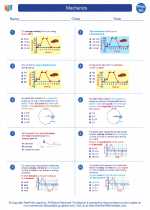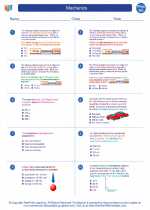Momentum
Momentum is a fundamental concept in physics that describes the quantity of motion an object has. It is a vector quantity, meaning it has both magnitude and direction. The momentum of an object can be calculated using the formula:
center;">p = m * v
Where:
The units of momentum are kilogram meters per second (kg m/s).
Key Concepts
There are several key concepts related to momentum:
- Conservation of Momentum: In a closed system, the total momentum of the system remains constant, provided no external forces act on it. This principle is known as the conservation of momentum.
- Impulse: Impulse is the change in momentum of an object when a force is applied to it for a certain amount of time. It can be calculated using the formula:
center;">I = F * Δt
Where:
- Momentum in Collisions: The principle of conservation of momentum is often used to analyze and solve problems related to collisions. There are two types of collisions: elastic collisions, where kinetic energy is conserved, and inelastic collisions, where kinetic energy is not conserved.
Study Guide
To understand and master the concept of momentum, it is important to practice solving problems and understanding the principles associated with it. Here are some steps you can follow to study momentum effectively:
- Review the formula for momentum and understand how mass and velocity affect the momentum of an object.
- Practice calculating momentum for different objects with varying masses and velocities.
- Understand the principle of conservation of momentum and its implications in different scenarios.
- Work on problems related to impulse and understand how forces can change the momentum of an object over time.
- Study different types of collisions and their characteristics, particularly elastic and inelastic collisions.
- Practice solving problems related to collisions, applying the principles of conservation of momentum to analyze the outcomes.
By following these steps and practicing regularly, you can develop a strong understanding of momentum and its applications in physics.
.◂Physics Worksheets and Study Guides High School. Mechanics
The resources above cover the following skills:
Core Ideas for Knowing Science
Physical Science
Changing the movement of an object requires a net force to be acting on it.



